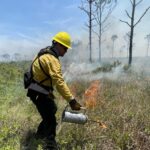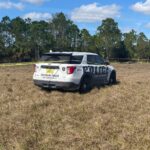FELLSMERE — Fellsmere Farms and the county’s citrus leaders hosted a tour and discussion with Rep. Bill Posey Wednesday to give the congressman a first hand look at Florida’s citrus industry.
After the tour, Rep. Posey said he plans to continue to push for federal funding to assist in researching cures to citrus ills, including greening and canker, which threaten to kill citrus across the country. The congressman said he would also try to get a US Congress member from Florida on the agriculture committee to better represent the state. Currently, Florida is not represented on the committee.
“I know you’re doing what you can,” said Fellsmere Farms General Manager Michael Monroe.
Monroe, along with Doug Bournique of the Indian River Citrus League, took Rep. Posey through the packing plant and the citrus groves.
Bournique told Rep. Posey during the tour that at 20,000 acres of citrus, Fellsmere Farms alone is larger than all of Texas’ citrus combined.
He added that approximately 80 percent of the county’s citrus is shipped to overseas markets, including Japan. Some Japanese have even invested in groves and packinghouses in the Indian River market, Bournique said.
While inside the packinghouse, Rep. Posey walked the line, watching as electronic scanners evaluated the grapefruit passing by.
“I’ve never seen anything like that before,” the congressman said.
Wednesday’s tour of Fellsmere Farms was Rep. Posey’s first time at the site and the first time he’s seen a packinghouse actually in operation. He said he’s been to another citrus packinghouse before, but it wasn’t in use at the time.
“It’s amazing how automated it is,” Rep. Posey said after the tour, adding that he was equally amazed by how many hands are still involved in the process.
Bournique explained during the tour that the fruit is still harvested and packed by hand due to the fruit’s fragility.
Employees also work to sort the fruit into different “grades” for various markets – high grade, below grade, canning/processing. Lines of workers quickly grab pieces of grapefruit as they fly by on conveyor belts to be tossed into either red or yellow chutes. The fruit not selected bounces onto another conveyor belt for other sorting.
Fellsmere Farms packs an average of 20,000 cartons of fruit daily during season, according to James Martin, director of packing for Bernard Egan & Co. – owner of the farm and others in the region.
“We’re going to have a hell of a crop,” Bournique said while riding through the citrus groves, provided Mother Nature doesn’t cause trouble.
He explained that the extended cold weather the region experienced kept the citrus trees dormant for longer and they’re all now starting to come out of it at the same time, making for a uniform crop.
“Finally, something good to come out of that lousy winter,” Rep. Posey said.
Along with trying to find cures to citrus diseases such as greening and canker, citrus growers are working to find ways to minimize wind within the groves.
Bournique said that the diseases spread through the wind and rain and by cutting down on the wind, citrus growers can decrease the risk of the disease spreading.
Fellsmere Farms has planted non-citrus trees throughout the groves to help do just that. The farm is currently trying a species of eucalyptus known as torillanas, which can get to 20 feet tall in two years.
“It won’t stop a hurricane,” Bournique said, but it is expected to minimize the winds blowing through the groves.
After the tour, Rep. Posey went to a luncheon hosted by the Indian River Citrus League, where he was expected to discuss the state’s citrus industry.
“I’m going there to listen,” the congressman said.
Bournique said that the message he wants Rep. Posey to take back to Washington, D.C., is the need for research funding.
“It’s still continuing to spread,” Bournique said of citrus diseases.





